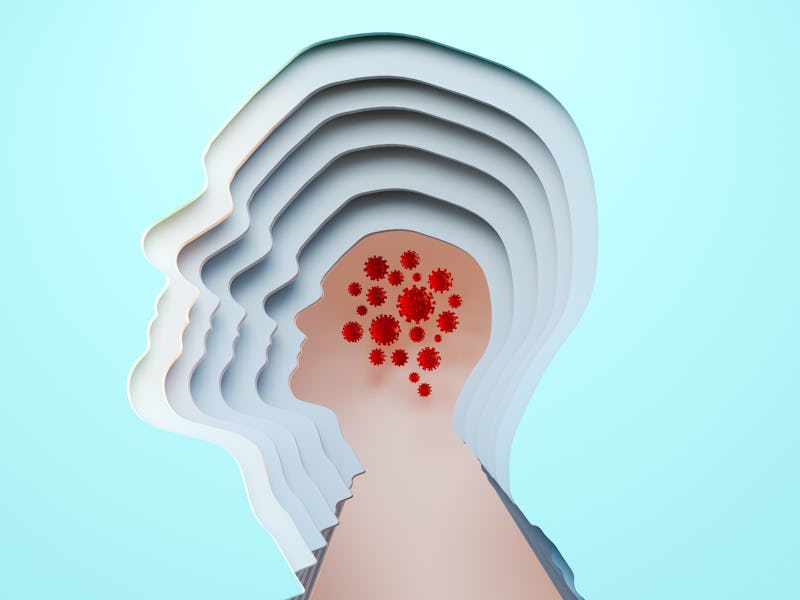Coronavirus vaccines found to cause an overlooked, positive outcome
New results reveal an unintended consequence of vaccine rollout.

The campaign to distribute Covid-19 vaccines is an effort to combat severe illness and death.
But according to new research, vaccinations can also boost another component of health: well-being.
In March 2020, researchers at the Center of Economic and Social Research (CESR), a research institute at the University of Southern California, wanted to probe how the pandemic was influencing and changing Americans. One interest was evaluating how Covid-19 was influencing mental health, including perceived health risks and economic impacts.
Ultimately, participant surveys revealed a powerful relationship: that between being vaccinated and experiencing better mental health.
If you experienced poor mental health during Covid-19, this may feel obvious: Vaccinations mean a high chance of survival and a return to a vague sense of normalcy. You can feel more confident hugging a grandparent, or returning to your favorite restaurant if you are vaccinated.
But these results also speak to the determinants of vaccine hesitancy, and an unintended consequence of vaccine rollout. Research suggests people who felt more anxious about Covid-19 were more likely to get vaccinated. Appealing to the mental health benefits of immunization may be an underutilized technique in the attempt to increase vaccinations.
Health care workers are vaccinated in Portland, Oregon.
And it’s likely this study is only capturing a small portion of the overall effect, explains Francisco Perez-Arce, a CESR economist. “The overall impact of the vaccination campaign on mental health may have been larger,” he tells Inverse.
This is because of the way the study was conducted. Overall, Perez-Arce and colleagues examined the survey responses of 8,003 adults who took part in the Understanding America Study. They were surveyed at regular intervals between March 2020 and March 2021. The participants were asked about two main factors:
- Their self-reported mental distress
- Their Covid-19 vaccination status
The study team, in turn, found that receiving the first Covid-19 vaccine resulted in “significant improvements in mental health, beyond improvements already achieved since mental distress peaked in the spring of 2020.” Those who did not receive the vaccine did not see similar improvements in mental health.
But there’s nuance here: The results only capture the reduction in mental distress among the people in this survey during this specific time period, not the overall effect of the vaccination campaign. Meanwhile, among those who weren’t vaccinated during the study period, were both people who were eligible but hesitant, and people who were not eligible. But both were placed in the “never vaccinated” group.
Perez-Arce provides himself as an example:
“I wasn’t vaccinated during the study period because I was not yet eligible,” he explains. “So, if I had been a respondent of the survey, I would be in the “control” group, but I certainly was becoming relieved from fears and experiencing less worry just by knowing that family, neighbors, my health care providers, my children’s teachers, etcetera, were getting vaccinated.”
In New York City, workers at museums, gyms, restaurants, and other public establishments have begun to check people’s vaccination status.
The results offer a stark contrast to other studies conducted earlier in the pandemic: In a 2021 study published in the journal Perspectives on Psychological Science, researchers argue psychological factors like stress, depression, and loneliness can impair the immune system’s responses to vaccines.
“Recent data suggest these psychological and behavioral risk factors are highly prevalent during the Covid-19 pandemic,” write the researchers, “but intervention research suggests that psychological and behavioral interventions can increase vaccine efficacy.”
It remains to be seen whether similar interventions could also increase vaccine acceptance — but it’s an interesting line of thought:
Would more people be vaccinated if they could count on it easing some mental health burdens? Would the vaccine improve overall health in two ways?
For now, Perez-Arce is concentrating more on the effect of the pandemic on mental health.
“It is important to understand the — likely multiple — mechanisms through which the pandemic has affected mental health in the population,” he says. “This study shows the important role that reducing risks through vaccination can play to improve mental health.”
This article was originally published on